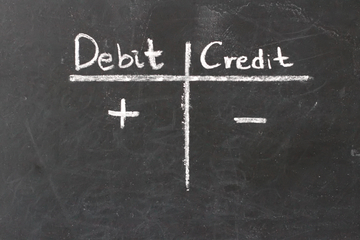You may be aware of credit scores and might look at yours frequently through a free service offered by your bank or credit card company, but have you ever asked yourself, “What is a credit report?” While a credit score is a three-digit number that tremendously influences our lives, a credit report is a report offered by each of the three major consumer credit bureaus that details specific accounts, balances, payment histories, and personal information. This detailed report creates your credit score.
Familiarizing yourself with the details on your credit reports helps you understand your credit history, why you might have been turned down when applying for credit, and discover whether or not someone has tried to steal your identity. Also, regularly checking your Equifax, TransUnion, and Experian credit reports could uncover potential inaccuracies on one of the reports that could negatively impact your credit.
Lenders look beyond your three-digit credit score for signs about how well you manage credit that is distributed across your whole credit report. Information across your report might inform a lender how much interest to charge you, tell a landlord if you’re a good bet for a new lease, or indicate to an auto insurance company if you are deserving of lower rates.
With so much information, it can be challenging to know where to start in the world of credit reports, but we’ve got you covered. Read on to learn how to get your credit reports and read them.
Key Takeaways:
- Your credit report has a tremendous influence over your life, it can impact everything from new credit applications to insurance rates and job opportunities.
- It is imperative that you review your credit report carefully each year
- Knowing what to look for on your credit report is important. Always dispute any information you feel is incorrect.
- Use your report to uncover opportunities to improve your credit management and grow your creditworthiness.
How To Get a Credit Report
Under the Fair Credit Reporting Act (FCRA), the federal government enacted certain rights and protections for consumers regarding credit reports.
Because of the FCRA, a consumer:
- Has the right to dispute information on their credit report.
- Must be notified if information in their report is used against them in a credit application or other transactions.
- May remove old, negative information after seven years (10 years for some bankruptcies).
- Can verify the report’s accuracy if required for an employment decision.
- Has a right to see at least one report every 12 months from the three credit bureaus.
To access your free credit reports, you may order one each year from Equifax, Experian, and TransUnion individually. Another option is to navigate to AnnualCreditReport.com and get all three reports at once by filling out a simple form and downloading each.
What Is in a Credit Report?
While each credit report will appear differently, each will contain the same four primary categories of information.
Personally Identifiable Information
When you’re applying for credit, the lender must know they are using the credit report for the correct person. Your name, address, date of birth, social security number, and employment information are all part of your Personally Identifiable Information. If new information is provided at the time of the credit application, it will be updated with the credit bureau.
Additionally, any past addresses, any past aliases, and "Personal Statements" will be included in this section. Personal Statements refer to items like fraud alerts, power of attorney statements, or a security freeze.
Credit Accounts
Your lenders will report on the accounts you have established with them regarding the type of account, the date it was opened, the loan or credit card limit, your account balance, and your payment history.
This section determines the bulk of your credit score calculation and deserves a careful read-through to ensure the information is correct.
Credit Inquiries
With every application for a credit account, you authorize the lender to pull a copy of your credit report. Each new credit request for the purpose of opening a new credit account is considered a “hard inquiry” and could impact your score. These credit hits are typically considered much more minor than missed payments or being over-leveraged.
When lenders pull your credit to see if they can pre-qualify you for a loan or credit card without your implicit request, that is a “soft inquiry,” which has no impact on your credit score.
If a lender sees a lot of hard inquiries, it could indicate a higher risk to them as you want to take on more credit for some reason, and could negatively impact your credit score.
Public Records
Previously, several extensive public records were recorded on your credit report, such as tax liens and civil judgements. Public records now primarily reflect bankruptcies. A Chapter 7 bankruptcy, a total write-off of your debts, will stay on your report for ten years, whereas a Chapter 13, a guided repayment of your debts, stays on your information for seven years.
How To Read Your Credit Report
Knowing the four components of your credit report is very important, but learning how to read them and what to look for matters most. Your ability to borrow money, qualify for low insurance rates, rent a home, or get a job could be impacted.
Start With Your Personal Information
Your personal information is what lenders and others use to identify you. If it’s wrong, it’s easy to confuse it with other applicants that might have similar names. It could also represent misreported information that doesn’t apply to you and could confuse your report with others. If it’s wrong, it could even impact your ability to pass the security questions required to download your credit reports.
This section looks closely at addresses, names (both current and former), social security number, and public records. Is your name slightly misspelled, or is a digit off on your social security number? Of the addresses listed, do you not recognize one? Ensure you dispute this information if it is wrong on any credit bureau’s report.
If the information is wrong, it could set you up to be confused with someone else.
Move To Credit Accounts
The detail of your credit accounts is the most crucial part of your credit report and must be reviewed thoroughly. When reviewing, you could find accounts that show as still open despite being closed or misreporting of your payment history. You could also find accounts you didn’t know you had, a clue to identity theft.
First, look at your accounts and identify each and their status. Is the account currently live, closed, or unknown? Label each, and be sure to follow up on those that are questionable. Make sure the type of account is properly represented.
Second, review your payment history. Negative accounts will show whether a payment was reported as 30, 90, 120, or 150 days late. Reports might show these on-time or late payments differently, so it is important to review each for accuracy.
Ensure your accounts show as current, have correct or similar balances, don’t show they were mistakenly placed in collections, and that your account limit is correct. The amount owed may not be accurate, as the company might not have yet reported your last payment to that credit bureau. Your records will show the last reporting date for the account, so you’ll know if new activity has transpired that has not yet been recorded.
Revolving account limits deserve special attention as limits reflected as much lower than they actually are could impact your credit-to-debt ratio.
Lastly, note why a closed account says it was closed. It could have been closed by you, and misreported that it was closed by a creditor for problematic payments.
Your goal throughout this process is to look for any information that is incorrect and shouldn’t be on your report.
Check Your Credit Inquiries
Ensure that your credit inquiries are correct. Look for hard inquiries unrelated to any applications you may have made for credit.
If you see that credit card X checks your credit and results in a hard credit hit, but you never applied with that company, challenge it with the credit bureau.
Are Your Public Records Correct?
Credit reports now contain few public records, whereas they once reflected far more. Still, a bankruptcy could be misreported or not even yours. If a Chapter 13 bankruptcy shows as a Chapter 7, it will stay on your credit report longer.
Why Is a Credit Report Important?
Your credit report can impact transactions from insurance quotes, loan applications, employment opportunities, or renting a home, to name a few. Ensuring it is correct matters.
In the U.S., a credit report is the ultimate reflection of your level of responsibility and ability to meet your obligations. If a landlord sees that you never miss a payment, they may feel better about renting to you. An insurance company could interpret that fabulous payment record as a higher likelihood to be a safe driver, the utility company might see a responsible report as a reason never to charge you a deposit, or an employer could view it as an indicator that you are trustworthy.
Most importantly, all lenders will look at this report when determining whether to issue you a credit card, a home loan, a car loan, or any other form of credit. Additionally, when they base the interest rate of your credit on how responsible they believe you to be, it could make all of the difference if a loan is affordable or not.
A deposit you can’t afford, an apartment denial, a job rejection, or high insurance rates could all result from adverse credit reporting.
Regularly reviewing to ensure the information on your credit report is correct is crucial.
How to Dispute an Error on Your Credit Report
If you see an error on your credit report, it is essential that you dispute it with the credit bureau. Before doing so, the first step is gathering supporting documentation backing up your claim. Submit it with a detailed letter explaining why you are disputing the error.
According to the Consumer Finance Protection Bureau (CFPB), your dispute letter should include:
- All of your contact information
- The credit report confirmation number, if you have it
- A list of the errors you’d like fixed, including the account numbers for disputed accounts
- An explanation of why you are making the request
- An ask that the information be corrected or removed
- A copy of that credit bureau’s report with the problematic or disputed items highlighted
- Copies of any supporting documentation
Supporting documentation might even include information from the other credit bureaus that correctly show the transaction.
It is suggested to send your request via certified mail to know that it was received.
Should your request go unanswered or the issue isn’t adequately resolved, do not hesitate to contact the CFPB, as the agency exists to protect your interests first.
Bottom Line
Your credit report can have far-ranging impacts on everything from new credit to employment. It’s essential that it’s correct and you know the impact of showing an excellent record.
Reading your report every year is tremendously important to identify misrecorded details or information of concern. Don’t hesitate to dispute a record that looks wrong. It could be extremely beneficial to correct misrecorded information.



